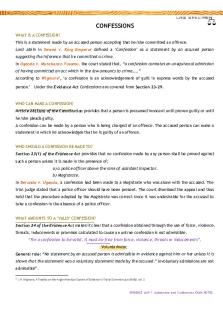2. Confessions to Crime PDF

| Title | 2. Confessions to Crime |
|---|---|
| Author | Andy Reynolds |
| Course | The Criminal Process |
| Institution | Northumbria University |
| Pages | 1 |
| File Size | 93.5 KB |
| File Type | |
| Total Downloads | 95 |
| Total Views | 150 |
Summary
Tony Ward - Criminal Process (Evidence) Lecture 2...
Description
Lecture 2
24/01/2018
Confessions -
Christopher Halliwell and Det. Supt. Fulcher (2011)
-
A confession is – “Any statement wholly or partly adverse to the maker, whether made to a person in authority or not and whether made in words or otherwise” – PACE s82 (1), it includes mixed statements which include a defence or other important areas of the statement, it may only be used in prosecution evidence against the maker of the confession.
-
Whenever the prosecution wants to rely on a confession, the defence may raise one of two issues to counter argue the confession; (1) by oppression of the person who made it (2) in consequence of anything said or done which was likely to render unreliable in the circumstances at the time any confession which might be made by him in consequence thereof. – R v Paris, Abdullahi & Miller (1993), R v L (1994)
-
If the defence raise one of these problems, it is up to the prosecution to completely prove beyond reasonable doubt that this was not how the confession was obtained.
-
False Confessions …
-
Cherie McGovern Case Study – Questioning somebody who is not well, has been denied a solicitor and then confessed to murder but this was achieved in circumstances that were likely to make the admission unreliable, she then re-confessed but this was also unreliable because the things said and done in the firs interview still impacted the confession.
-
Generally ‘serious and substantial’ breaches of the codes of practice will render any admission unfair – Keenan (1990), Walsh (1989), examples of reasons that evidence was not admissible: Deception of suspect and solicitor – Mason (1987), Kirk (1999), Failure to caution suspect as to offence being investigated – Kirk (1999), breach to the right of free impartial legal advice – Samuel (1988), Walsh (1989), breach of the regulations of having an ‘appropriate adult’ – Aspinall (1999)....
Similar Free PDFs

2. Confessions to Crime
- 1 Pages

Parties to a crime
- 6 Pages

Limitations to crime mapping
- 5 Pages

Confessions Summary
- 1 Pages

Admissions AND Confessions
- 7 Pages

Organized Crime chapter 2
- 7 Pages

Project 2 - crime mapping
- 8 Pages

Confessions of the fox
- 3 Pages

Lecture 2 - Media and Crime
- 2 Pages

Acquisitive crime
- 5 Pages

Queixa- Crime
- 5 Pages
Popular Institutions
- Tinajero National High School - Annex
- Politeknik Caltex Riau
- Yokohama City University
- SGT University
- University of Al-Qadisiyah
- Divine Word College of Vigan
- Techniek College Rotterdam
- Universidade de Santiago
- Universiti Teknologi MARA Cawangan Johor Kampus Pasir Gudang
- Poltekkes Kemenkes Yogyakarta
- Baguio City National High School
- Colegio san marcos
- preparatoria uno
- Centro de Bachillerato Tecnológico Industrial y de Servicios No. 107
- Dalian Maritime University
- Quang Trung Secondary School
- Colegio Tecnológico en Informática
- Corporación Regional de Educación Superior
- Grupo CEDVA
- Dar Al Uloom University
- Centro de Estudios Preuniversitarios de la Universidad Nacional de Ingeniería
- 上智大学
- Aakash International School, Nuna Majara
- San Felipe Neri Catholic School
- Kang Chiao International School - New Taipei City
- Misamis Occidental National High School
- Institución Educativa Escuela Normal Juan Ladrilleros
- Kolehiyo ng Pantukan
- Batanes State College
- Instituto Continental
- Sekolah Menengah Kejuruan Kesehatan Kaltara (Tarakan)
- Colegio de La Inmaculada Concepcion - Cebu




